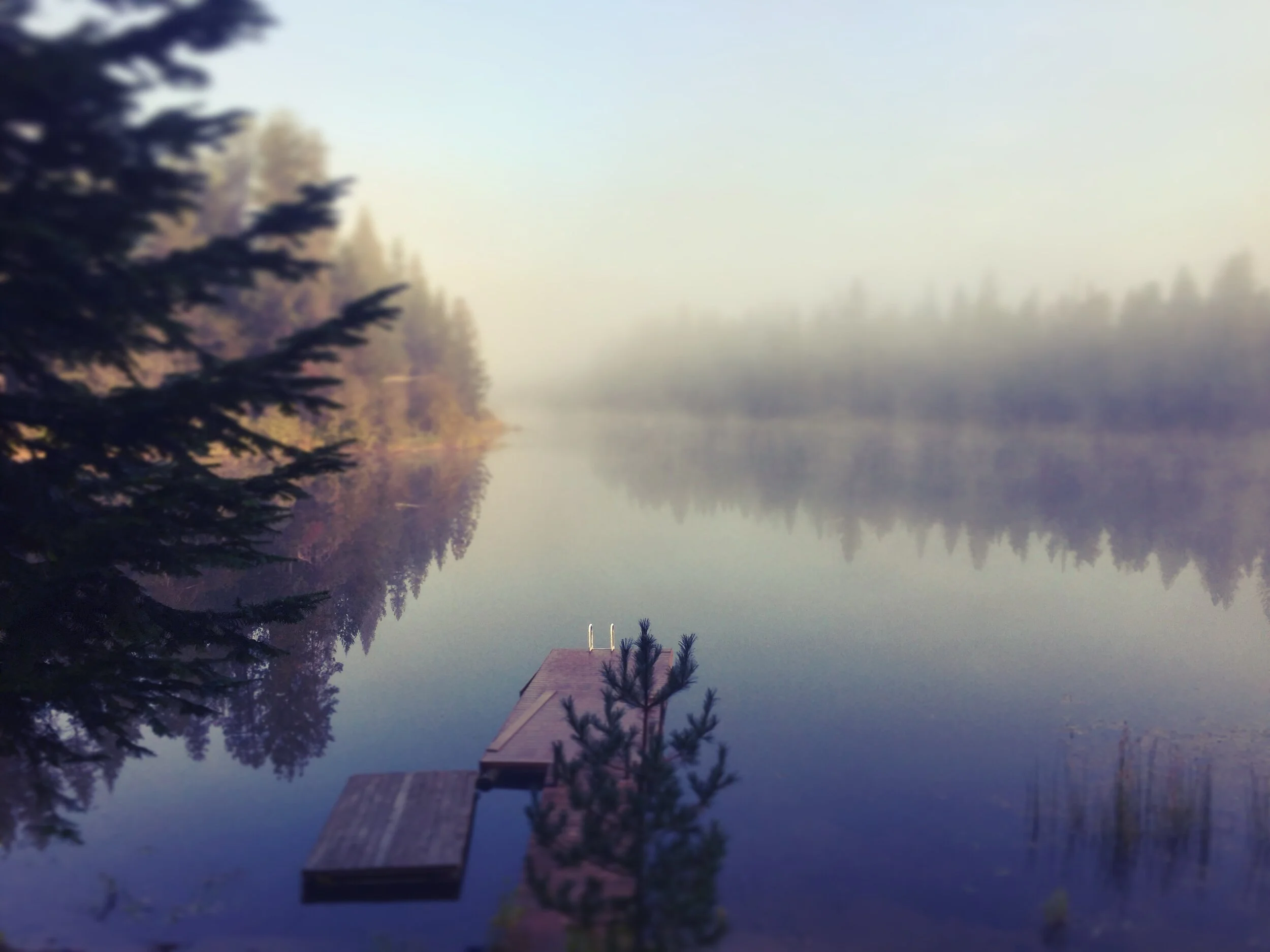The fear of visibility is common among the people I work with. It’s definitely something I struggle with also. Sure, there are plenty of good reasons to be afraid. And there are ghosts from embarrassing-things-past that still haunt us. Here are 5 ways to help you overcome the fear of visibility when it's stopping you from achieving your goals and living your true passion.
The Permission to Feel Wellness
After injury or trauma, we learn to feel fragility and guard against further injury. The problem occurs when we don’t switch back, when we’re still operating like we’re injured even after healing. But who gives you permission to say you are well? Who says it’s okay to begin life again full-force? Who celebrates your health? Here are 3 ways to give yourself permission to feel wellness.
My Creed
Finding the deep-down joy in selfhood
The False Alarm and the Trauma Response
I learned a strange life lesson this summer.
It was between 3 and 4 am. There was a warm breeze coming through the windows. We were both sleeping deeply. Then the smoke alarm in the bedroom began screaming at us.
We went all through the house—at least twice. We didn’t find any smoke or fire. No hot doorknobs. No unusual smells.
Then finally we looked at the alarm itself for answers. It expired over ten years ago.
It was a false alarm.
It was simply faulty wiring or a bad sensor. But the alarm didn’t know that.
This can be what it’s like after a trauma trigger.
The body has many ways of responding to trauma, but this is one of them: hypervigilance. Scanning for the emergency outside of your body, when it’s residual from a past experience.
And it’s frightening.
Years ago, this happened to me. I was in a crowded train station. There was a loud strange noise. The alarm bells sounded inside of me—so much that I couldn’t tell if there was actually an emergency. I looked toward the people around me for their response—they were all just going about their days. My body was trying to tell me something. It took me years to unravel all that ‘something,’ but the point is:
You are not alone.
Your body is telling you something. It may need help. You may not know the ‘how’ or ‘what,’ but I can help with that. This is a physiological, biological response.
It’s not your fault.
If you’re like me, maybe you need to hear it twice. This isn’t your fault. This is just your body reacting to something. And there is help out there so this doesn’t happen quite so often or strongly.
You can get better.
P.S. The life lesson I learned from the false alarm this summer was: when you move into a new place, maybe this isn’t the first (or hundredth) thing you do, but at some point, check your smoke alarms so you don’t end up with extremely expired faulty smoke alarms like me.
Upside-down
Oh, dear. I’ve been upside-down lately. Literally. I’ve been laid up with a back injury for a few weeks now.
I’m reminded of living with pain/chronic illness. For anyone who needs to hear this:
Enduring pain and recovering from illness is its own thing. You don’t need to spend this time moodboarding or meditating or planning your financial future.
Recovery and Rest is ENOUGH.
Making it through the day is ENOUGH.
Receiving and accepting the help you need is ENOUGH.
I’ve done many difficult things in my life and I can honestly say :
The simple act of getting into a chair during my first days of injury was as hard as anything I’ve ever done.
Remember to give yourself gentle kindness and space to heal and receive.
And congratulations on making it through each day…Even if you are well.
Tolerating the Fear of Visibility
Think back to a time when you were truly unafraid to be yourself. For me, my mind often finds my eleven-year-old self. That quirky little preadolescent was exuberant, joyful, and unconcerned with the judgment of others.
Back then I was a goalie for my local soccer team. I wasn’t the best. But every game, I stood in goal and I tried. And I owned being a goalie–it was a core part of my identity. I allowed myself to be this thing, without qualification or judgment.
The thing that made me a goalie wasn’t my skill, it was my courage. My willingness to keep trying. My ability to recover after goals scored on me. My ability to tolerate visibility-both in good and hard moments.
I didn’t need to be the best. I just needed to be.
I’d like to think my eleven-year-old self is cheering me on now, is saying it’s okay to keep trying. To remember a time when I wasn't the best, but I was joyful and courageous. That short little gumdrop I used to be is part of me—and I can breathe and smile and access the power from those moments anytime I need.
How can you integrate past moments of being in your power to help you now & step into a deeper, more joyful, judgment-free self-understanding?
Resilience: Beyond the Buzz
A lesson from my 13-year-old self. Rewind time: Gym class, 8th grade. It was the end of the year and our PE class had a track & field unit. One day our teacher set up a series of hurdles. We were divided into groups to jump the hurdles with minimal (read: no) instruction. My group was last. Everyone before me jumped the hurdles without trouble. Then it was my turn.
I ran to the first hurdle and jumped. My foot got caught. I tripped. I fell. I got up. I ran to the second hurdle. I jumped. My foot got caught. I tripped. I fell. I got up.
And repeat–for eight more hurdles. When I was done, people congratulated me. They said they couldn’t believe I kept going. A lightning bolt went through me at that moment–until then, I didn’t even know I had any other options.
For a long time, I thought that’s what it was like to be resilient. To keep trying in the face of adversity–and that’s still the simple definition many people still use. It took me years to understand that I should have never done the hurdles without instruction, that I was set up to fail in a system not designed for someone like me even though everyone else around me succeeded without struggle. Sure, I kept trying and ostensibly that’s a good thing, but should I have felt like I had no other options?
Resilience is a buzzword right now. Since it’s so prominent in my presence, it’s time I talk about what it means to me–and what it doesn’t have to mean.
Some time in my adulthood, a medical practitioner told me I was the most resilient person he knew. Out of all of his patients, everyone in his personal social network, it was me. It was humbling. It meant a lot to hear that–to me, it validated my struggles, my experiences, and my ability to cope over time. (at this point, we’re WAY beyond the hurdles–but you probably figured that out by now).
He said it to me when I wasn’t at the peak of productivity or functioning. He said it when I was vulnerable, in a tender moment. And that’s what resilience means to me–continuing through and beyond grief, tenderness, trauma, being visible when you’re terrified of being seen, of GOING, continuing, living, of being.
Resilience isn’t only about bouncing back after trauma–you’re never really the same after you go through something–and that’s okay. It isn’t really even about how well someone is functioning after a traumatic event–there are many nuances around that and this NPR article does a great job connecting the over- or mis-use of resilience in the context of colonialism, capitalism, racism, and slavery.
To me, resilience is about integrating the things you know, the things you’ve been through, the things you aren’t yet sure about within yourself. It’s about being able to see life from many angles. And yes, it’s about continuing, and going, but not like I did in the 8th grade in track and field. I’ve run through that scenario SO many times at this point…a fully resilient me would have tried once or twice, said this isn’t for me, and gone and done something to make myself and spirit feel good like pick dandelions or frolic in the grass. Resilience isn’t about continuing within a system in the face of adversity–it’s about you, the person, doing what is most aligned and integrated with yourself, your spirit, and being able to know yourself well enough to do what’s right for you when things get tough. So don’t jump someone else’s hurdles if it’s not right for you.




